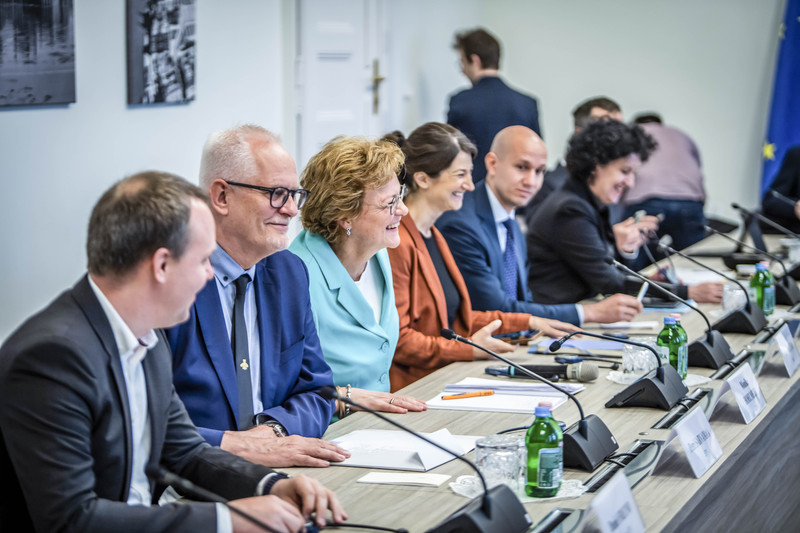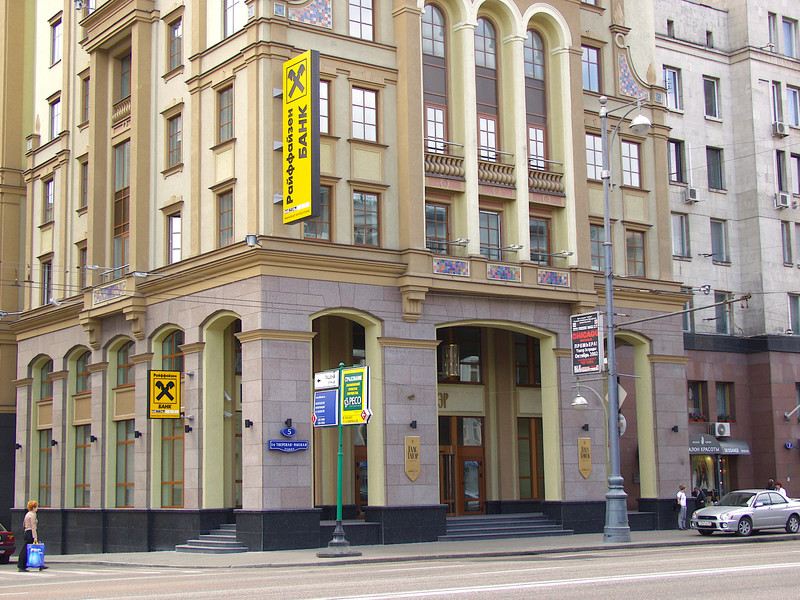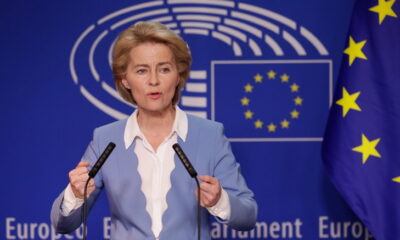Business
2023 tech predictions: AI writers, testing crypto times and ‘be ready’ for EU Big Tech regulation

While predicting the year ahead should be taken with a handful of salt, some indications of what could be in store for the technology sector in 2023 have emerged.
Artificial intelligence (AI) has surfaced as a big player this year, while the hype bubble over the metaverse appears to have burst. Meanwhile, cryptocurrencies have nosedived amid scandal and economic pressure and the tech sector has seen job cuts en masse.
Euronews Next takes a look at what could lie ahead for the tech and crypto sectors in 2023.
Artificial intelligence
AI has made major strides this year, especially with ChatGPT, a powerful AI chatbot from the Elon Musk-founded OpenAI foundation, which is self-censoring and generates text at a user’s request.
“I think the area that will continue to see great strides in is very much AI,” said Ajay Chowdhury, Boston Consulting Groups’ managing director, senior partner and BCG X Lead for the UK, Ireland, the Netherlands and Belgium.
He also said added that with ChatGPT you could even write this article on the future of the tech – and a “pretty good one at that”.
He noted the journalist’s expertise would still be needed “but as a research tool, it’s absolutely astounding”.
Chowdhury told Euronews Next that we will see the democratisation of this kind of AI fundamentally changing a lot of industries, especially the media.
“The media sector is always the first to be hit by these new technologies and I think is going to really make a lot of media companies think about creativity and talent,” he said.
But AI will affect every industry as its problem-solving capabilities can speed up the time to dig into masses of data, making many business decisions cheaper.
The metaverse gamble
Last year, there was much hype around the metaverse after Meta CEO Mark Zuckerberg unveiled his big bet on the virtual reality world, which has not taken off as he had hoped.
Meta’s shareholders have grumbled about the costly change of focus and have seen the company’s stock fall more than 65 per cent this year. Meta also laid off 11,000 employees in November.
“The metaverse was the big bet that I think a lot of people in the tech sector decided to make, especially Zuckerberg,” said Chowdhury.
“The reality in tech is that stuff takes a lot longer to happen than you would expect,” he said, adding that this applies to Meta’s metaverse but that there are “other amazing virtual worlds” where consumers can go or that can be used for educational and training purposes.
The tech sector’s economic woes
Job cuts have not just hit Meta, but other tech giants such as Amazon, Twitter and Lyft.
The US tech sector in particular very much got ahead of itself in terms of hiring in the beginning, said Chowdhury, and growth and valuation have now started to plateau, resulting in job cuts.
“The markets had given them a bit of a free pass on costs because they were growing so fast and as the macroeconomic headwinds have come in, they’ve suddenly realised that their markets are slowing down. They want to focus on the bottom line and frankly, they had too many people,” he said.
But this could be an opportunity for smaller or niche tech companies to hire talent from the tech giants.
For Europe, war was inflicted this year in Ukraine, and the economic shock has hit the continent far more than in other parts of the world with rampant inflation and rising energy prices.
This could have an impact on venture capital funding, resulting in lower investment in start-ups and innovation.
Innovation in synthetic biology, quantum computing or advanced AI robotics is going to be far more profound in the next five to 10 years than the last two decades. But these start-ups need funding to do that. Chowdhury said if they do not, Europe could lag behind the US and China in terms of innovation.
Cryptocurrencies
The challenging economic times have also impacted the price of cryptocurrencies this year, but that is not all.
The industry has also seen the spectacular collapse of the third-largest crypto exchange FTX, run by Sam Bankman-Fried.
It comes as the entire crypto market lost more than $1.4 trillion (€1.3 trillion) in value this year amid multiple crashes, including the Terra Luna saga.
It has been a testing year for the crypto and web3 industry as the markets took a turbulent ride with the rise and fall of Terra Luna and FTX, said Samantha Yap, Founder and CEO of YAP Global, an international PR and communications consultancy focused on blockchain and decentralised finance (DeFi).
But she also said this year has seen the growth of multi-chain ecosystems, meaning users do not have to switch between networks when making transactions through several chains simultaneously.
“The promising thing about these ecosystems growing is the focus on the technology and the applications it can enable, which is the most interesting part about the crypto industry”.
“As we reflect on what will resist the bear market, we must go deeper into the fundamentals of crypto technology and figure out why we truly believe in the technology. If we don’t have this conviction in the tech, then it will be hard to survive the trough of this wave,” she said.
But economic conditions will have an impact on the crypto industry, which will “be constrained by the macro conditions such as high interest rates and sluggish global markets growth,” said Danny Chong, co-founder of the decentralised finance app Tranchess.
“Investment activities will be much slower than in the past two years with investors taking a “wait-and-see” attitude. Their decisions will also be affected by the wider market environment,” he said.
“Investors will be more stringent in their selection of projects with greater due diligence of operational and governance processes, the background of team members, and balance sheets”.
Government regulation, especially in cryptocurrency, is likely to be big in 2023.
The Markets in Crypto-Assets (MiCA) Regulation, the EU’s legislation for governing digital assets across member states, is expected to come into force in early 2023.
The law aims to maintain financial stability and protect investors while also promoting the transformation in the crypto asset sector.
Meanwhile, the EU’s internal markets chief Thierry Breton has warned online platforms will have to “be ready” for September 1, 2023, when the Digital Services Act (DSA) will definitely come into force.
The DSA legislation is essentially aimed at social media companies and is intended to tackle online hate speech and disinformation, protect children and prevent consumer fraud.
Violations can trigger fines of up to 6 per cent fine of a company’s global turnover and even a ban on operating in the EU in case of serious and repeated breaches. Website users will also be able to seek compensation for any damage caused by the providers’ failure to comply with the new rules.
Business
MEPs Urge Orban, To Act To Unlock EU Money

MEPs in charge of controlling the spending of EU funds continue to be “greatly concerned” about how Hungary manages EU money. They have called on Prime Minister Viktor Orban to implement reforms that will unblock EU funds that are currently suspended.
Monika Hohlmeier, a German MEP of the centre-right party, told reporters in Budapest on Wednesday (17th May) that “our goal is not to stop money; our goal is to spend the money in Hungary.”
The delegation of the European Parliament’s budget control committee reviewed the progress of the implementation of 27 super milestones – the measures that the EU Commission has set forth for the Hungarian government to unfreeze Cohesion and Covid Recovery Funds.
Hohlmeier stated that Hungary should implement measures “as quickly and as soon as possible”.
Last December, the EU countries approved a plan to grant Hungary EUR5,8bn under the bloc’s Covid-19 Recovery Plan, on the condition that Budapest implement 27 reform targets. These included strengthening judicial independence, and putting new anti-corruption measures in place.
The EU also suspended EUR6.3bn of cohesion fund payments to Hungary due to concerns about rule-of-law, which the EU claimed put the budget of the bloc at risk.
The negotiations between the government of Hungary and the commission are ongoing, but without any breakthrough.
MEPs do not have a direct say in the unlocking of funds. The European Parliament has kept up political pressure on EU officials to ensure that Hungary adheres to EU rules regarding independent judiciary, and fights corruption before receiving EU funds.
“The picture that emerged” […] Lara Wolters, a Dutch left-wing MEP, said that the lack of information regarding financial oversight of government expenditures, as well as issues in control audits of public procurements and conflict of interests, is a major concern for us.
“Real structural change is the only way to bring about real change.” [changes]She added that the media in Hungary was hostile towards the committee.
Media close to the government asked the MEPs at the press conference if EU money was connected to Hungary’s rejection to perceived EU policies regarding migration, gender and Ukraine. They also asked if the MEPs supported the delivery of weapons to Ukraine and what they thought of corruption in Brussels.
Petri Sarvamaa, a centre-right MEP from Finland, said in Budapest: “We don’t invent this stuff.” He added: “Our only purpose is to make sure that the EU budget in any member state is not at risk. This is not about Hungary.
Hohlmeier also added that the committee traveled to Spain Italy and Bulgaria to monitor EU expenditure.
Daniel Freund, German Green MEP, however, said that despite his eighth visit to Hungary he found “unthinkable” things in any other EU country.
“A rule by decretal, a state emergency for eight years, now ongoing, 95 amendments to the budget [in 2022] “Armed inspections of a food pantry by the tax authority without the participation of the national Parliament,” Freund said.
“We want EU funding to go to Hungary to build schools, put solar panels on the roofs, have fast internet everywhere and to provide social assistance to Hungarians who are most vulnerable,” he said.
“But we do not want EU funds to be used to enrich the family members and friends of Mr Orban, by breaking EU rules regarding fight against corruption and prevention of conflict of interest,” Freund added.
Tibor Navracsics said on Wednesday that he believed the European Parliament delegation had not read all the background material sent to them in advance.
According to media reports, he also claimed that political biases had influenced many MEPs’ opinions and that as a result factual errors have been made in some cases.
Business
Growing Fear EU Firms In Russia May Be Forced To Finance War

The EU is preparing to assist their companies in leaving Russia amid the growing risk that they will be taxed and used to fund the war of Russian President Vladimir Putin.
The proposals for the 11th round Russia sanctions, as seen by EUobserver include special new permits and legal services to help European companies get out.
Since the beginning of the war, more than 1,600 Russians and Russian entities have had their assets frozen by EU.
The 11th round adds another 100 names.
The new proposal allows EU countries to authorize financial transfers to Russians on the blacklist “after determining that such funds or resources are necessary to complete transactions, including sales which are strictly required for the winding down, by 31 August 20,23, of a joint-venture or similar legal arrangement established with this person or an entity owned or controlled by this person before 28 February 2020”.
The EU also banned European law firms providing commercial services to Russian customers.
The 11th round proposal is intended to ease this as well, in order to help untangle the related EU-Russian interests within Europe.
The proposal stated that “Competent Authorities of the Member States may Authorise until 31 Dec 2023 the Provision of Legal Services which are Mandatory… for such divestments, such as Notary Services”,
According to a running count kept by Yale University, the US, and last updated on May 16, more than 1,000 foreign companies have already fled Russia in the past year.
There are still dozens of large European companies operating in Russia.
Some of the biggest European banks (Deutsche Bank ING Bank Raiffeisen Bank International UniCredit, OMV and Total) and energy companies (Engie, OMV and Total) are included.
This includes well-known brands such as Armani Benetton Diesel Lacoste and Lacoste.
Also included are the following: Austrian energy drink maker Red Bull; Danish medical equipment manufacturer Coloplast; Dutch consumer goods company Phillips and drinks producer Heineken; Estonian taxi firm Bolt and French hotel chain Accor, Clarins cosmetics maker and German engineering firm Bosch.
Staying in Russia for the past year has been a calculated risk of financial reward versus reputational risk.
Since the war, the share value of Austria’s Raiffeisen Bank International fell by 40 percent due to the opprobrium that comes with staying in place.
According to the independent Russian newspaper Novaya Gazeta, profits from its Russian operations reached a record EUR2.2bn by 2022, which accounted for more than 60% of total profits.
Russia is making it difficult for its old friends in the West to leave.
The Foreign Investment Commission of the Russian Finance Ministry now requires strategic firms, such banks and energy companies to obtain permission from the commission to sell Russian assets.
Novaya Gazeta reported that the government only issues 10 or so permits per month, despite a waiting list of 700 applicants.
In March, Russia made matters even worse by stating that foreign firms would have to pay a 10% tax on assets sold if they decided to leave.
The Russian Finance Minister Anton Siluanov said at the time that “we are creating conditions so… exit is not beneficial for foreign business”.
The new legislation that is coming could make staying even more of a financial and moral risk than before.
Due to favorable double-taxation agreements, most European companies paid little or no tax on their profits in Russia.
But, in March, the Finance Ministry proposed freezing these tax treaties with about 40 “unfriendly countries” that imposed sanctions against Russia, including the EU 27.
Putin has not yet implemented the proposal, but it is a matter that could be decided by a presidential order at any time.
His symbolism could be exposed after the EU imposes the 11th round in the coming weeks.
Putin also publicly asked on 2 May that his government “clarify” how it will handle dividend payments in the future to shareholders from “unfriendly” countries.
According to a Russian source who requested anonymity due to the sensitive nature of the information, new rules could see an up to 25% tax imposed on the Russian profit of EU firms like Armani, Clarins and Raiffeisen, as well as the rest of those who stayed.
Russian trap
Source: Siluanov’s exit fee of 10 percent could lead “Western companies unaware of the future dividend taxes to maintain some presence in Russia”, the source said.
“But once you’ve done that, [double-tax] After the termination of agreements, Moscow will impose new taxes on Western companies that are still present in Russia. They would be required to pay a tax on dividends up to 25%,” the source said.
EUobserver reported that “this would actually turn these companies into sponsors of Russian war efforts”.
The EU Foreign Service never comments on details about upcoming sanctions such as its motivations for suddenly lubricating European divestments.
It also told this site that advice to private companies was a primary matter of national competency.
It added: “This time is not the right time to do business with Russia or in Russia because of its war against Ukraine, and due to the unpredictable nature of the local economy, investment and rule of law environments.”
This was only one of many warnings that Putin was preparing a bribe to foreign investors.
Exiled Russian tycoon Mikhail Khodorkovsky – whose oil company Yukos was seized 15 years ago by the Kremlin – warned on 2nd May that Putin had “demonstratively constructed an illegitimate, lawless state”.
“The withdrawal of assets was something that should have been started long ago, even before war. And on 24 February 2020 [the date of the Ukraine invasion]Khodorkovsky stated that the decision should have been taken.
Business
[Exclusive] MEP Luxury Pension Held Corporate Assets In Tax Havens
![[exclusive]-mep-luxury-pension-held-corporate-assets-in-tax-havens](https://eurotimes.eu/wp-content/uploads/2023/05/1420-exclusive-mep-luxury-pension-held-corporate-assets-in-tax-havens.jpg)
While the European Parliament was demanding a clamp down on tax havens, many of its own MEPs were using their monthly office allowances to finance a luxury pension scheme that held corporate assets in the Cayman Islands, Bermuda and elsewhere.
The investments, including in large banks requiring bailouts, were made at the height of 2008-2010 financial crisis that had ushered in mass unemployment and austerity cuts affecting ordinary Europeans.
Among those were 16,000 shares of Cayman Islands based Teck Resources Ltd, Canada’s largest diversified mining firm. The shares were held shortly before the European Parliament passed a resolution slamming the role played by tax havens in encouraging and profiteering from tax avoidance.
“When investments take place through jurisdictions such as Cayman Islands and Bermuda, it should definitely make the alarm bells go off,” said Tove Maria Ryding of Tax Justice advocacy group.
Ryding said that although not all investments through these jurisdictions are problematic, they should definitely be a reason for introducing extra precaution and high standards of transparency.
The latest revelation also comes at a time when the European Parliament is trying to regain public trust in the wake of the Qatargate corruption scandal, where one of its now former vice-presidents is awaiting trial wearing a police ankle monitor.
The investments were made on the behalf of a so-called voluntary pension fund, a Luxembourg-based scheme that is currently running a €379m actuarial deficit and which may require a taxpayer bailout as as early as next year. MEPs at the time only had to contribute two years into the fund in order to then receive a pension for life.
The parliament’s secretive leadership, known as the Bureau, is currently scrambling for solutions in the hopes of avoiding another public relations disaster ahead of the 2024 European elections.
The issue has riled critical MEPs who have for years been piling on pressure for the Bureau to come up with answers but to no avail. Among them is Monika Hohlmeier, a German centre-right MEP who chairs the powerful budgetary control committee.
“The Voluntary Pensions Fund has been causing me serious headaches for some time now,” she said, in an email.
“When I now hear that the investment strategy included assets in tax heavens such as the Cayman Islands, then it just adds to the ever-growing list of problems this fund accumulated”, she said.
Coal mine shares aside, the fund also held numerous shares in the Bermudas, as well in other tax havens like Hong Kong, Singapore, and Switzerland. The fund eventually bounced back to pre-global financial crisis figures, noted asset managers in a 2011 report.
EUobserver obtained the list of investments spanning 1994 to 2010 from the Luxembourg business register.
But the breakdown of individual investments stops post 2010 with the European Parliament refusing to release any further details.
“The voluntary and complementary pension fund for MEPs was created in 1990, when there was no single statute for MEPs,” said a spokesperson from the European Parliament.
“The fund was closed in 2009, when the new MEPs’ single statute entered into force,” she said, noting the fund is a non-profit association governed by Luxembourgish law.
Although no longer open to MEPs since 2009, the fund is still making investments today on their behalf.
Asked about those investments, she said the European Parliament was unable to comment because the fund is a “third party”.
This comes despite the fund’s board being composed of sitting MEPs, including Janusz Lewandowski and European parliament vice-presidents Othmar Karas and Roberts Zile.
Zile is the parliament’s document gatekeeper. Late last year, he refused a freedom of information request filed by EUobserver to disclose additional information on the voluntary pension fund.
And earlier this month, the European Parliament passed its budget report and called upon the Bureau to clarify the entitlements of current and past MEPs stacking up multiple pensions.
The Greens had tabled an amendment demanding MEPs withdraw from the voluntary pension fund if they already receive another pension.
But that amendment was voted down 272 against 203. Among those rejecting it were Lewandowski, Karas, and Zile. The latter two are beneficiaries of the voluntary pension fund.
Other notable beneficiaries include the EU’s foreign policy chief Joseph Borrell as well as former European climate commissioner Miguel Arias Canete and others.
-

 Sports7 days ago
Sports7 days agoOfficial: Juventus announces sixth purchase
-

 Health & Society7 days ago
Health & Society7 days agoThe intoxicated society
-

 Politics5 days ago
Politics5 days agoThe Russian patriarch to Putin: You are the first truly Orthodox president
-

 Sports6 days ago
Sports6 days agoBeautiful Juve: Vlahovic and youth rout Verona. Thiago Motta first
-

 Sports6 days ago
Sports6 days agoJuventus, Vlahovic: “Now we play a different game.”
-

 Politics3 days ago
Politics3 days agoEU Intensifies Pressure: Six-Month Extension of Russia Sanctions
-

 Health & Society2 days ago
Health & Society2 days ago7 Superfoods That Will Boost Your Fitness Results
-

 Politics2 days ago
Politics2 days agoStatement by President von der Leyen at the joint press conference with President Metsola following the European Parliament Plenary vote










